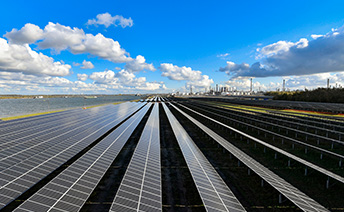World Business Council for Sustainable Development (WBCSD)
WBCSD states that it is a global, CEO-led organisation of more than 200 businesses working collectively to accelerate the system transformations needed for a net zero, nature positive, and more equitable future.[1] The member companies come from all business sectors and all major economies.[2]
Membership of board/executive committee: Shell is a member of the executive committee.
- 2022 assessment outcome: Aligned
- 2021 assessment outcome: Aligned
Summary
Shell benefits from its membership of WBCSD, which provides an important platform for Shell to exchange information with businesses around the world on issues relating to sustainability. WBCSD also brings the voice of business to the UN climate and biodiversity negotiations and will serve as the secretariat for the Energy Transition Alliance at COP28.
We particularly welcome WBCSD’s work in 2022 to drive transparency in Scope 3 emissions reporting, piloting the Task Force for Nature Related Financial Disclosures framework and driving harmonisation in other non-financial disclosure frameworks.
We have found WBCSD to be aligned with our climate and energy transition-related policy positions.
We will encourage WBCSD to:
- Support ending routine flaring by 2030 or sooner.
We will remain a member of WBCSD. We will continue to engage the association on climate and energy transition topics. We will continue to track alignment between WBCSD’s climate and energy transition-related positions and our own.
Further information
Click on the sections below to read more.
- WBCSD has stated: “We actively call for policies that are consistent with ambitious action on climate and enable business-led solutions to scale and speed implementation of the Paris Agreement.”[3]
- WBCSD has stated support for limiting the global temperature rise to 1.5°C and achieving net-zero emissions by 2050.[4] [5]
- WBCSD has workstreams to help businesses and value chains achieve net zero by 2050; these include Built Environment Decarbonization, Transport & Mobility, and SOS 1.5.[6] [7] [8]
- WBCSD is a registered UNFCCC observer.[9] In 2022, it hosted events at COP27, and published a report for COP27 titled The Business of Climate Recovery that includes “a menu of specific interventions for accelerating the global decarbonization of business”.[10] [11]
- WBCSD states that its “Strategy 2022-2027 is a focused five-year strategy to accelerate the transformation of businesses and their value chains […] through climate, nature, and equity action”.[12] It states the strategy is aligned with its 2021 publication, Vision 2050: Time to Transform, a business action agenda that it states is aligned with the targets of the Paris Agreement.[13] [14] [15]
- WBCSD has stated support for “clear and consistent long-term government-led carbon pricing policies within a robust global carbon pricing framework”.[16]
- In its 2022 report, The Business of Climate Recovery, WBCSD states “the potential to scale and harmonize carbon pricing efforts seems to be growing, and current economic circumstances that require governments to raise fiscal revenue, promote innovation while also swiftly lowering GHG emissions may actually hold strong possibilities for policy innovation to raise climate ambition and create a breakthrough on carbon pricing.”[17]
- WBCSD is a strategic partner of The World Bank’s Carbon Pricing Leadership Coalition which states that it works “towards the long-term objective of a carbon price applied globally throughout the global economy”.[18]
- WBCSD has stated support for energy efficiency policies.[19] [20] In its 2022 report, The Business of Climate Recovery, WBCSD states an energy efficiency policy priority: “Review and enhance policies that improve energy efficiency in energy production and use. Investments in energy efficiency can immediately help to improve energy security and resilience as well as address cost of living concerns.”[21]
- WBCSD has stated a set of recommended policies to “accelerate the deployment of hydrogen with the lowest possible carbon intensity and create a global hydrogen market”.[22]
- WBCSD coordinates businesses’ hydrogen pledges for the H2Zero initiative, which aims “to increase market confidence in the growth of decarbonized hydrogen by 2030 and accelerate the use and production of hydrogen as an essential part of the future net-zero energy system”.[23] [24]
- In its 2022 report, The Business of Climate Recovery, WBCSD states a policy priority for industry to embed “the deployment of electrification, hydrogen and CCS technologies in national decarbonization strategies to ensure the most appropriate and competitive solutions with lowest possible life cycle emissions are adopted across the various industrial applications. Early recognition of required infrastructure and opportunities is critical.”[25]
- WBCSD has stated support for policies that encourage investment in nature-based solutions (NBS); WBCSD has stated that NBS “have a key role in sequestering carbon from hard-to-abate emissions and in mitigating climate change”.[26] [27] [28]
- In its 2022 report, The Business of Climate Recovery, WBCSD states “There is no net zero without nature positive” and that “high-quality Natural Climate Solutions (NCS) facilitate emissions reductions and the removal of CO2 through actions that protect, sustainably manage and restore nature.”[29] It also states a policy priority to support “the development of transparent, reliable – voluntary and regulated – carbon markets that enable the deployment of high-integrity NbS at scale through the establishment of regulations or incentives for voluntary actions”.[30] WBCSD also states that the use of carbon credits “should not happen in lieu of or to delay the emissions reductions necessary to meet long-term science-based targets for Scope 1, 2 and 3 emissions”.[31]
- WBCSD and the World Economic Forum convene the Natural Climate Solutions (NCS) Alliance, which WBCSD states “conveys the voice of businesses, NGOs and solution providers on the need to mobilize a high-integrity demand for high-quality NCS”.[32]
- In its 2022 report, The Business of Climate Recovery, WBCSD states the need for policy to embed “the deployment of electrification, hydrogen and CCS technologies in national decarbonization strategies to ensure the most appropriate and competitive solutions with lowest possible life cycle emissions are adopted across the various industrial applications. Early recognition of required infrastructure and opportunities is critical.”[33]
- WBCSD has stated support for common standards and benchmarks to allow comparison of environmental, social and governance (ESG) reporting.[34] [35] [36]
- In its 2022 report, The Business of Climate Recovery, WBCSD states as a policy priority: “Adopt the International Sustainability Standards Board (ISSB) as the global baseline for sustainability reporting and make disclosure against ESG and sustainability related risks mandatory across jurisdictions.”[37]
- WBCSD and Radley Yeldar published Reporting Matters 2022, their tenth annual review of WBCSD member companies’ sustainability and integrated reports, which highlights reporting trends and good practice.[38]
- WBCSD has stated that “green and transition taxonomies help to foster significant investment in the infrastructure needed to provide reliable and resilient net-zero carbon energy across the globe” and runs a Shaping sustainable finance policy project.”[39] [40]
- In its 2022 report, The Business of Climate Recovery, WBCSD states as a policy priority: “End new coal-fired power plant development and financing immediately. Develop plans to phase out coal-fired power generation by 2030 for advanced economies, and 2040 for other countries at the latest, and only where absolutely required prevent unabated use of coal through Carbon capture and storage (CCS) for otherwise stranded, long-life assets.”[41]
- WBCSD is a partner of the Powering Past Coal Alliance (PPCA), a coalition of national and subnational governments, businesses and organisations working to advance the transition from unabated coal power generation to clean energy.[42] [43]
- In its 2022 report, The Business of Climate Recovery, WBCSD states a policy priority for industry is to embed “the deployment of electrification, hydrogen and CCS technologies in national decarbonization strategies to ensure the most appropriate and competitive solutions with lowest possible life cycle emissions are adopted across the various industrial applications. Early recognition of required infrastructure and opportunities is critical.”[44]
- WBCSD states its REscale initiative “brings together leading companies representing the full renewable energy value chain to accelerate deployment of renewables and the transition to a low-carbon electricity system”.[45]
- WBCSD has stated support for a range of policy measures to reduce methane emissions, including “well-designed regulation of methane emissions” and “national/regional reporting frameworks for emissions from venting, flaring and leakage and standard definitions”.[46] WBCSD has not stated a position in support of ending routine flaring by 2030 or sooner.
- In its 2022 report, The Business of Climate Recovery, WBCSD states as a policy priority: “Strengthen international collaboration to help all countries adopt an end date for the sales of internal combustion engines in line with net-zero, on all segments, as per the recent announcement of the European Union or California, with a particular focus on developing economies”.[47]
- In 2022, WBCSD stated that it will work with the Zero Emission Vehicles Council, which aims to accelerate the pace of the global transition to zero emission vehicles, to “organize dialogues between companies that are ready to invest in zero emission vehicles deployment and governments prepared to enact and implement enabling policies”.[48]
- WBCSD states that it runs a “Mobility Decarbonisation” project, which aims to “bridge the gap to a net-zero scenario for road transport by supporting and increasing the deployment of charging infrastructure and Zero-emission vehicle technologies”.[49] [50]
- WBCSD has stated that heavy road transport decarbonisation will be needed through a “combination of electric solutions, electro-fuels and sustainable low-carbon biofuels” and “heavy-duty land transport transitions to zero-emission drivetrains".[51] WBCSD has also specifically stated support for accelerating the use of hydrogen in heavy transport.[52]
- In its 2022 report, The Business of Climate Recovery, WBCSD states the importance of transitioning heavy industry, including aluminium, cement, chemicals and steel. [53] It states policy priorities that include: “Design market and policy environments tailored to the varying maturity levels of different technical solutions and industry sectoral needs. Public-private partnerships are critical for coordination across sectors and energy vectors, and to attract investments at pace.”[54]
- WBCSD has stated support for the decarbonisation of aviation and has stated that robust policies and regulations are needed to stimulate investments in sustainable aviation fuel capacity and related infrastructure.[55] [56] [57]
- WBCSD has stated support for the decarbonisation of shipping.[58] [59]
- WBCSD has partnered with the Smart Freight Centre to produce new guidance to support logistics (including shipping) on its journey to net-zero emissions in March 2022.[60]
[1] https://www.wbcsd.org/Overview/About-us
[2] https://www.wbcsd.org/Overview/About-us
[3] https://www.wbcsd.org/Programs/Climate-and-Energy/Climate/Climate-Action-and-Policy
[4] https://www.wbcsd.org/Imperatives/Climate-Action
[5] https://www.wbcsd.org/contentwbc/download/9499/144264/1
[6] https://www.wbcsd.org/Programs/Cities-and-Mobility/Sustainable-Cities/Transforming-the-Built-Environment/Decarbonization
[7] https://www.wbcsd.org/Pathways/Transport-Mobility
[8] https://www.wbcsd.org/Programs/Climate-and-Energy/Climate/SOS-1.5
[9] https://www.wbcsd.org/Programs/Climate-and-Energy/Climate/Climate-Action-and-Policy
[10] https://www.wbcsd.org/Overview/News-Insights/Insights-from-the-CEO/No-time-to-waste-the-only-way-is-forward-COP27-and-the-accountable-road-to-COP28
[11] https://www.wbcsd.org/Overview/Policy-Advocacy-and-Member-Mobilization-PAMM/Resources/Business-of-Climate-Recovery-Accelerating-Accountability-Ambition-and-Action
[12] https://www.wbcsd.org/Overview/News-Insights/General/News/WBCSD-grows-leadership-to-strengthen-capital-markets-engagement#:~:text=WBCSD%E2%80%99s%20Strategy%202022-2027%20is%20a%20focused%20five-year%20strategy,they%20operate%20through%20climate%2C%20nature%20and%20equity%20action
[13] https://www.wbcsd.org/Overview/News-Insights/General/News/WBCSD-grows-leadership-to-strengthen-capital-markets-engagement#:~:text=WBCSD%E2%80%99s%20Strategy%202022-2027%20is%20a%20focused%20five-year%20strategy,they%20operate%20through%20climate%2C%20nature%20and%20equity%20action.
[14] https://www.wbcsd.org/Overview/About-us/Vision-2050-Time-to-Transform
[15] http://www.timetotransform.biz/wp-content/uploads/2021/03/WBCSD_Vision_2050_Time-To-Transform.pdf
[16] http://www.timetotransform.biz/wp-content/uploads/2021/03/WBCSD_Vision_2050_Time-To-Transform.pdf
[17] https://www.wbcsd.org/contentwbc/download/15152/214400/1
[18] http://www.carbonpricingleadership.org/partners
[19] https://www.wbcsd.org/contentwbc/download/15152/214400/1
[20] https://wbcsdpublications.org/an-integrated-approach-to-energy-and-fuel-efficiency/
[21] https://www.wbcsd.org/contentwbc/download/15152/214400/1
[22] https://www.wbcsd.org/contentwbc/download/13039/191669/1
[23] https://www.wbcsd.org/Pathways/Energy/News/Six-new-companies-joined-the-H2Zero-pledges-to-accelerate-the-use-of-decarbonized-hydrogen
[24] https://www.wbcsd.org/Programs/Climate-and-Energy/Hydrogen-Pledges
[25] https://www.wbcsd.org/contentwbc/download/15152/214400/1
[26] https://www.wbcsd.org/contentwbc/download/15152/214400/1
[27] http://www.wbcsd.org/Programs/Food-and-Nature/Nature/Nature-Positive/Resources/Accelerating-business-solutions-for-climate-and-nature-Report-I-Mapping-nature-based-solutions-and-natural-climate-solutions
[28] https://www.wbcsd.org/contentwbc/download/10892/160980/1
[29] https://www.wbcsd.org/contentwbc/download/15152/214400/1
[30] https://www.wbcsd.org/contentwbc/download/15152/214400/1
[31] https://www.wbcsd.org/contentwbc/download/15152/214400/1
[32] https://www.wbcsd.org/Programs/Climate-and-Energy/Climate/Natural-Climate-Solutions/The-Natural-Climate-Solutions-Alliance
[33] https://www.wbcsd.org/contentwbc/download/15152/214400/1
[34] http://www.timetotransform.biz/wp-content/uploads/2021/03/WBCSD_Vision_2050_Time-To-Transform.pdf
[35] https://www.wbcsd.org/Overview/News-Insights/WBCSD-insights/Sustainability-information-is-crucial-for-valuing-companies-and-high-quality-data-is-key
[36] https://www.wbcsd.org/Programs/Redefining-Value/News/A-unified-approach-to-sustainability-reporting
[37] https://www.wbcsd.org/contentwbc/download/15152/214400/1
[38] https://www.wbcsd.org/contentwbc/download/15030/213118/1
[39] http://www.timetotransform.biz/wp-content/uploads/2021/03/WBCSD_Vision_2050_Time-To-Transform.pdf
[40] https://www.wbcsd.org/Programs/Redefining-Value/Shaping-sustainable-finance-policy
[41] https://www.wbcsd.org/contentwbc/download/15152/214400/1
[42] https://www.wbcsd.org/Programs/Climate-and-Energy/Energy/New-Energy-Solutions/News/WBCSD-joins-Powering-Past-Coal-Alliance-as-corporate-partner
[43] https://poweringpastcoal.org/
[44] https://www.wbcsd.org/contentwbc/download/15152/214400/1
[45] https://www.wbcsd.org/Programs/Climate-and-Energy/Energy/REscale
[46] https://www.wbcsd.org/contentwbc/download/13251/194099/1
[47] https://www.wbcsd.org/contentwbc/download/15152/214400/1
[48] https://www.wbcsd.org/Pathways/Transport-Mobility/News/New-initiative-to-accelerate-transition-to-zero-emission-transport-in-emerging-and-developing-economies
[49] https://www.wbcsd.org/Programs/Cities-and-Mobility/Transforming-Urban-Mobility/Mobility-Decarbonization
[50] https://zevtc.org/
[51] http://www.timetotransform.biz/wp-content/uploads/2021/03/WBCSD_Vision_2050_Time-To-Transform.pdf
[52] https://www.wbcsd.org/contentwbc/download/13039/191669/1
[53] https://www.wbcsd.org/contentwbc/download/15152/214400/1
[54] https://www.wbcsd.org/contentwbc/download/15152/214400/1
[55] http://www.timetotransform.biz/wp-content/uploads/2021/03/WBCSD_Vision_2050_Time-To-Transform.pdf
[56] https://wbcsdpublications.org/wp-content/uploads/2020/07/WBCSD_Business_Case_for_Sustainable_Aviation_Fuels.pdf
[57] https://www.wbcsd.org/contentwbc/download/15152/214400/1
[58] http://www.timetotransform.biz/wp-content/uploads/2021/03/WBCSD_Vision_2050_Time-To-Transform.pdf
[59] https://www.wbcsd.org/contentwbc/download/15152/214400/1
[60] https://www.wbcsd.org/Programs/Climate-and-Energy/Climate/SOS-1.5/News/New-guidance-being-developed-by-25-global-companies-to-support-the-logistics-industry-on-their-journey-to-net-zero-emissions










